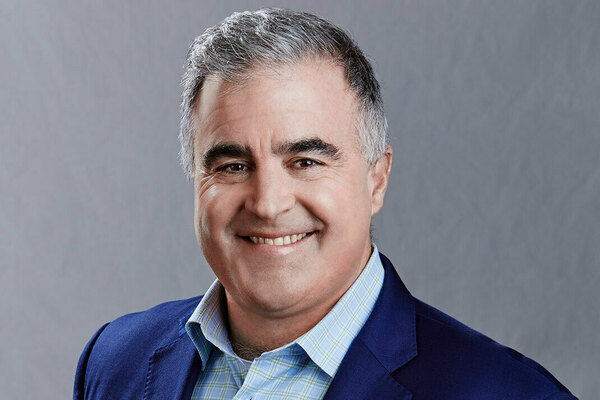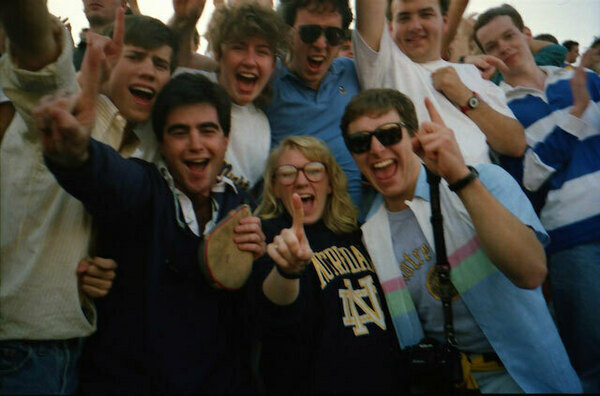
As a managing director in Accenture's Information Security group, John Blasi ’90 is constantly evaluating new security technologies. His goal is to stay ahead of would-be hackers and other malicious activity and to protect the company’s more than 500,000 employees worldwide.
To do so, the Chicago-based executive needs more than just technical skills in the people he hires — he needs a multidisciplinary team that is creative, adaptive, and responsive.
He needs liberal arts majors.
“We look for people from diverse backgrounds with imagination, strong communication skills, and the ability to work across multiple teams,” said Blasi, who majored in the Program of Liberal Studies. “You want people who can think like the bad guys, because the bad guys aren’t following some script. They’re looking for creative ways to penetrate your defenses.
“Some of my strongest people have not necessarily come from information security backgrounds — they’ve been people with liberal arts backgrounds who can think critically and aren’t always going to color inside the lines. They’re the kind of people we need to be able to respond at speed to that type of adversary.”
Blasi joined Andersen Consulting, now Accenture, nearly 30 years ago and has relied on the skills he gained in Arts & Letters throughout his career — in positions ranging from consulting to programming to selling and deploying complex change programs for clients.
“I've had a whole slew of different roles and responsibilities since I've been there,” he said. “And my liberal arts education has been really key to helping with things like critical thinking, communication, and storytelling, which is a big part of any kind of program management or journey management. Even in information security, external threats can seem distant, and it’s important to be able to tell stories in a meaningful way to help people understand why we’re asking them to take the steps we are.
“That ability to connect with your audience, to make things real, is just critical in any kind of executive role. And you get that from the liberal arts.”
“My liberal arts education has been really key to helping with things like critical thinking, communication, and storytelling, which is a big part of any kind of program management or journey management. ... That ability to connect with your audience, to make things real, is just critical in any kind of executive role. And you get that from the liberal arts.”
Preparation for life
Blasi came to Notre Dame as a pre-med major, but after his first year, he found he didn’t have the same passion for his science classes that he did for his smaller, seminar-style courses in Arts & Letters.

“If you really love something, you’re going to want to put more work into it and engage with it, and I just found I loved all my liberal arts classes,” he said. “Majoring in PLS gave me a great opportunity to dig into a lot of different things, and I knew I could always specialize from there. It was also a great way to take advantage of the teaching depth and the interesting professors that Notre Dame has.”
The “Great Books major” also gave Blasi the ability to read, analyze, and discuss large amounts of complex materials.
“The discussions and oral exams in PLS are great preparations for life,” he said. “It teaches you how to think quickly on your feet and how to answer a question confidently. And that’s great practice for preparing for meetings or hard discussions with clients or customers.”
Communication with empathy
After graduation, Blasi took a year to live and serve through Holy Cross Associates at a job service for the homeless that was part of a Catholic worker house in Phoenix, Arizona. The experience deepened his sense of empathy, while also giving him an opportunity to build real-world skills.
“It helps you understand what a very narrow niche of society you belong to and to be grateful and empathetic to others and their situation,” he said. “It also allowed me to do a lot of different things — working directly with clients, grant writing, and developing a database of jobs and a computer system we used to track our clients.”
Blasi has continued to volunteer and is currently on the board of the Carole Robertson Center for Learning, a nonprofit on Chicago’s West Side focused on early learning and families. He recommends that all students seek opportunities to broaden their perspectives through opportunities like service work and study abroad.
These experiences, along with his coursework in Arts & Letters, have helped him communicate across cultures as he works with colleagues to implement new initiatives on almost every continent.
“The global programs I run involve people in multiple countries, and I travel there to explain what we’re doing and how we’re launching a new system,” he said. “But people in different cultures communicate in different ways and approach conflict and challenges differently. So being aware of that and being able to assess those situations and communicate complicated information with respect and empathy is really important. And that’s something I developed from my liberal arts education.”
“People in different cultures communicate in different ways and approach conflict and challenges differently. So being aware of that and being able to assess those situations and communicate complicated information with respect and empathy is really important. And that’s something I developed from my liberal arts education.”
Originally published at al.nd.edu.